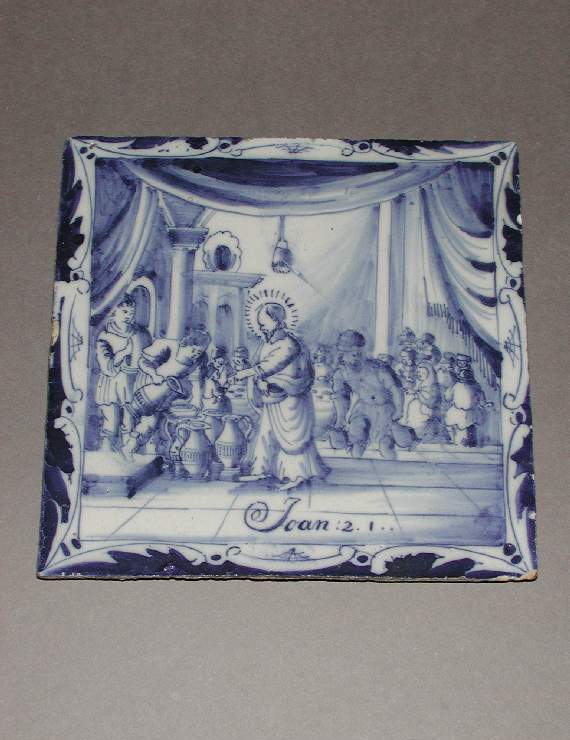Current Location: In storage
Titles
The Marriage at Cana
Maker(s)
Production:
Unknown
Entities
Categories
Description
Earthenware, tin-glazed white on the upper surface and painted in blue. In a square, framed by a scrolled border, 'The Marriage at Cana', inscribed below 'Ioan:2.1..'. There is a hole in the top left corner and in the lower right corner.
Notes
History note: Unknown before Dr J.W.L. Glaisher, FRS, Trinity College, Cambridge
Legal notes
Dr J. W. L. Glaisher Bequest
Measurements and weight
Depth: 0.8 cm
Height: 12.5 cm
Width: 12.7 cm
Acquisition and important dates
Method of acquisition: Bequeathed
(1928-12-07)
by
Glaisher, J. W. L., Dr
Dating
18th Century
Circa
1700
CE
-
1800
CE
Note
Label text from the exhibition ‘Feast and Fast: The Art of Food in Europe, 1500–1800’, on display at The Fitzwilliam Museum from 26 November 2019 until 31 August 2020: Tin-glazed tiles with Biblical scenes were widely produced in the Protestant world to decorate chimneys and hearths. These 9 Delftware examples depict episodes of food consumption or preparation from both the Old and New Testament, including the Wedding at Cana (bottom row, middle), when Christ turned water into wine to demonstrate God’s mercy, and The Temptation of Christ (bottom row, right) when Christ, famished after 40 days of fasting, refused Satan’s temptation to turn stones into bread. Each scene includes the relevant Biblical verse, so these tiles were instructive as well as decorative, teaching the viewer about good and bad food choices, which would have been particularly relevant in kitchens or dining rooms.
Components of the work
Decoration
composed of
high-temperature colours
( blue)
Front
composed of
tin-glaze
Materials used in production
Earthenware
Inscription or legends present
- Text: Ioan:2.1..
- Location: On front of tile
- Method of creation: Painted in blue
- Type: Inscription
References and bibliographic entries
Related exhibitions
Identification numbers
Accession number: C.2804.52-1928
Primary reference Number: 15692
Stable URI
Audit data
Created: Saturday 6 August 2011
Updated: Friday 1 August 2025
Last processed: Friday 1 August 2025
Associated departments & institutions
Owner or interested party:
The Fitzwilliam Museum
Associated department:
Applied Arts




